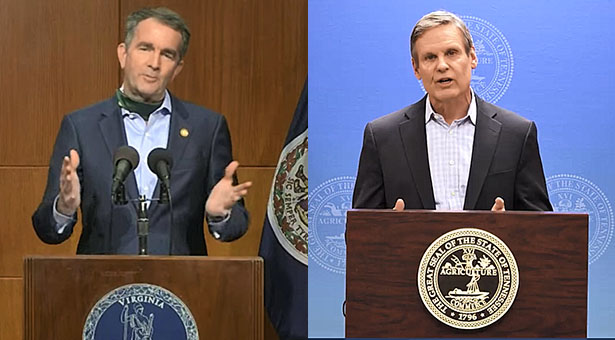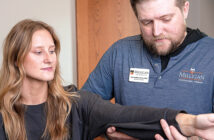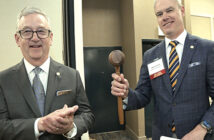Virginia exercises abundance of caution; Tennessee moves ahead with new rules
By Scott Robertson
For decades, the double yellow line in the middle of State Street in Bristol has been the demarcation that most visibly defined the Tennessee-Virginia state line. Today that line neatly marks the ideological gap between two different approaches state governments in America are taking in allowing the re-opening of businesses during the COVID-19 crisis.
Virginia has a Democrat-controlled General Assembly. The governor of the Commonwealth, Ralph Northam is actually Dr. Ralph Northam, a pediatric neurologist. The Tennessee General Assembly is heavily Republican, and one of Governor Bill Lee’s most frequently-repeated talking points is that government is, “People look to their government for leadership, but it isn’t the answer to all the problems we have.”
Both sides have been criticized. When Lee issued Tennessee’s Safer-at-Home order, critics noted that “essential business” exceptions were granted to landscape maintenance companies and boat marinas. Likewise, Northam’s more heavy-handed approach has garnered demonstrations from protestors across the state.

Virginia
On April 30, Virginia Delegate Israel O’Quinn hosted Secretary of Commerce and Trade Brian Ball and Deputy Secretary Cassidy Rasnick for a conference call with southwest Virginia business leaders, facilitated by the Bristol Chamber of Commerce. Ball and Rasnick asked for input from business leaders on several issues, most especially the notion of region-by-region re-opening. The pair also offered a candid and detailed explanation of why Virginia has not moved with the alacrity of its southwestern neighbor state.
Like Tennessee, Ball said, Virginia has assembled a task force of representatives from 30 businesses, large and small, to provide input on safe and sustainable re-opening. “Everybody wants to be able to do this safely,” Ball said of the tone and tenor of the task force’s discussions. “You’re going to need to in order to get consumers to feel safe. That’s been the general spirit that we’ve encountered.”
The task force will inform the recommendations used to formulate Forward Virginia, the Northam administration’s plan to eventually ease restrictions on business said Rasnick, who along with Deputy Secretary Angela Navarro has been leading the task force, according to Ball. “We are considering a phased approach, so we know that we are not going to turn the lights back on and everything go back to normal. There are some key indicators as to the health data that we’re looking at. The governor is really focused on following the data. He insists that the data guide these decisions.”
The first step in reaching Phase 1 will be the implementation of more widespread Coronavirus testing across the Commonwealth, Rasnick said, for the purpose of, “having that capacity to really know what we’re seeing and where those things are. At the same time, the Commonwealth intends to increase access to personal protective equipment to not only first responders, but to the general public.

After that, Rasnick said, data from the testing results will guide the government’s hand. “We are looking for 14 days in decline in the trend on percentage of positive tests and 14 days in decline in hospitalizations. Those are really going to be what makes the decision to move into Phase 1, which will likely still include restrictions on how businesses operate. Those restrictions are being developed by the governor’s business task force as well as public health officials.”
“We hope to be able to provide recommendations to the governor on how certain business sectors will be able to operate when they’re told to ease restrictions and potentially re-open in a different phased approach,” Rasnick said. “The guidance we have developed so far with the task force is one set of general business guidance that will apply to all businesses as they operate, including rules on physical distancing, enhanced cleaning and disinfection and enhanced safety practices.
“We have also developed a set of guidance for business sectors that are impacted specifically by the governor’s Executive Order 53 – restaurant and beverage facilities, brick and mortar retail, fitness and exercise facilities, personal care and grooming services like barber shops and entertainment and public amusement. Those are all represented on the task force and we are making sure we have developed recommendations that are validated by the public health data we have in preventing disease transmission, but are also practical for those businesses to implement.
“That’s why it was so critical to have the business task force pressure testing our recommendations,” Rasnick said, “and they have given a lot of positive feedback. We have been heartened by the fact that there has not been any push at all toward putting economic recovery above public health. That’s because our interest in economic recovery and public health are really aligned.
“These businesses have reflected that the only people who will truly re-open the economy are the consumers,” Rasnick said.
“We want to make sure that when we as a government say, ‘it’s safe for you to go back out and eat in a restaurant,’ that consumers can trust us. We know the worst thing we can do is tell them it’s safe to go out and they go out and there’s a big spike in public health cases, and then we’re looking at a long-term hit to consumer confidence if we’re not able to do this in a way that folks feel protected. The business community has been telling us, ‘we’re willing to do whatever we can to operate safely. They want to protect their employees, their consumers and their families.”
In Southwest Virginia, there has been a great deal of interest in the state allowing a regional system of rolling re-openings in which less affected areas open before those with higher infection counts. Just days before, Governor Northam himself asked rhetorically of the state line, ““Is it fair for one side’s businesses to be open and the other’s not?” before issuing a non-commital, “Stay tuned.”
The reason for the lack of commitment lies in the difficulty of achieving the task without setting off a new string of problems. Rasnick asked attendees on the call for ideas on how to achieve regional re-opening before laying out a list of potential difficulties.
“We all know there are good reasons for why we should do it. But, the critical thing is how we do it. People have alluded to the arbitrary boundary of the state line running down State Street in Bristol. If we did a regional re-open, we would be creating a lot of new arbitrary boundaries throughout the state.
“Certainly there are fewer reported cases in many areas of the Commonwealth, but because our testing is limited right now, do we know that communities where the cases are currently reporting low actually have a low prevalence of the disease or are we actually just seeing a testing deficit? If we re-open some areas before others, is there a higher risk of moving that spread from one region that does have a higher case incidence to another because folks are really desperate to get their hair cut and want to go out? If that were the case, we might enable, or even encourage transmission from one region to another.
“We might also do additional harm to re-tighten those restrictions after loosening them for a period of time,” Rasnick continued. “So if people from a region with higher incidence come to your region and bring this with them, are you in a better or worse position, having been able to open your restaurant for a few weeks, had the financial obligations of restocking, and then going in and having to tighten those restrictions again? We’re thinking about unemployment insurance interruption, healthcare and childcare for employees, and then again that long-term hit to consumer confidence.
“There are so many problems. Do we open schools on different schedules for different regions? How do we address commuting patterns for people that live in one region and work in a different region? How do we navigate fairness for border communities? How do we mitigate picking winners and losers on this front while still mitigating health risk?”
Ball concluded by telling the call, “The veil is not going to lift quickly. We have to be very measured and thoughtful about this.”
Tennessee
The Tennessee Pledge is in effect.

On April 24, Governor Lee announced, “Tennesseans pulled together to flatten the curve, and it is time for people to begin to get back to work and back to their businesses. We are pursuing a careful, measured approach to reopening our economy that does not depend on heavy-handed mandates but instead provides practical tools for businesses of all sizes.”
The earlier re-opening was made possible because of the very kinds of statistical data Virginia plans to rely on, but augmented by an earlier availability of widespread testing. In the days leading up to the announcement, Tennessee had seen the average daily growth rate remain stable for 14 days, in addition to a steady downward trajectory in positive tests as a percentage of total tests since April 1. The state has also had a massive ramp up in testing, included open testing available to all Tennesseans.
“Like the rest of the country, Tennessee has taken an unprecedented economic hit with families and small businesses feeling the most pain,” Lee said. “We must stay vigilant as a state, continue to practice social distancing, and engage in best practices at our businesses so that we can stay open.”
The Tennessee Pledge is so named because the state asks all employers to pledge to abide by state guidelines, though there is no enforcement mechanism beyond the honor system.
Among the guidelines for all re-opening Tennessee businesses:
• Allow employees to work from home as much as possible
• Screen all employees reporting to work at place of business for COVID-19 symptoms and direct any employee showing symptoms to leave the premises immediately and seek medical care.
• Implement workplace cleaning and disinfection practices, according to CDC guidelines.
• Mitigate exposure in the workplace by implementing social distancing guidelines and modify scheduling.
In addition to the Tennessee Pledge general guidelines, a separate set of guidelines applies to restaurants, including, but not limited to:
• Have dedicated face coverings and dedicated gloves (i.e., only used by one person) worn by all employees, at all times, but these should not be N-95 or medical variety – those should be saved for use by healthcare workers.
• Limit the number of customers in the restaurant to 50% of seating capacity
• Tables should be spaced at least 6 feet apart
• Limit tables to no more than 6 guests per table
• Mark any indoor or outdoor waiting area so that social distancing standards are met (options can include a text system to alert guests of available seating, an intercom system, or only one member of a party being allowed to wait in the waiting area)
• Bar areas should remain closed
Yet another set of guidelines has been issued for retail
establishments:
• Staff should wear face coverings (not N-95 or medical masks, which should be reserved for healthcare workers) and other personal protection items as recommended by the CDC
• Provide a sanitizing station such as a wash basin with soap and/or bottle of hand sanitizer
• Stagger shifts, breaks, and meals, in compliance with wage and hour laws and regulations, to maintain social distancing
• Limit the number of customers inside a store at a given time, excluding employees and representatives of third-party delivery companies, to 50 percent or less of store occupancy based on Tennessee’s Building and Fire Code
• Customers should wear face coverings inside the store
• Consider dedicated shopping hours or appointment times for the elderly, medically vulnerable, and health care workers
• Establish one-way aisles and traffic patterns for social distancing
• Increase curbside, pickup, and delivery service options to minimize contact and maintain social distancing
• Assign dedicated staff to prompt customers regarding the importance of social distancing
• Establish enhanced cleaning protocols that follow CDC guidelines including sanitizing shared resources (such as carts) after each use, and sanitizing all high traffic / high touch areas (such as counters check-out lanes, keypads, break rooms, dressing rooms, rest rooms) every two hours and when visibly dirty
• Use a clearly designated entrance and a separate clearly designated exit to maintain social distancing
• Use plastic shields or barriers between customers and clerks at service counters, and clean them frequently (every 2 hours and when visibly dirty)
• Adjust store hours to allow time for enhanced cleaning
• Task management-level employees within a store to monitor compliance
And on April 30, the same day Ball was telling southwest Virginians, “there is no playbook for this,” Lee announced an exhaustive set of guidelines in Tennessee by which “close contact” businesses providing personal services including barbershops, hair salons, waxing salons, nail spas, massage therapy services and substantially similar businesses that require prolonged close contact with customers could re-open as of May 6.
“As we continue a measured reopening of the economy, it’s critical we provide evidence-based guidance to businesses so they can keep their employees and customers safe,” Lee said. “The very nature of close contact businesses calls for strong solutions and we’re inspired by the willingness of these small business owners to take the Tennessee Pledge. These guidelines will allow thousands of businesses to reopen, put their employees back to work, and serve customers in a thoughtful and safe manner.”
• Limit the number of customers to 50% of fire code capacity, and practice strict social distancing between customers
• Services will be offered by appointment only; no walkins
• Prohibit use of waiting areas (e.g., could adopt such practices as notifying customers by call or text message) or serenity lounges; limit use of other common areas by multiple people at one time (e.g., elevators, breakrooms, etc.)
• Ensure thorough workstation and equipment disinfection after each customer (i.e. sanitize all equipment, instruments, capes, smocks, linens, chairs and work area); alternatively, utilize single-use or disposable items
• Implement enhanced sanitization of commonly touched surfaces and equipment (i.e., at least every two hours and when visibly soiled), using CDC recommended sanitizers and disinfecting protocols
• Daily deep cleaning and sanitization to be completed for high-touch areas (tanning beds, massage tables, salon chairs, etc.)
• Do not allow non-customer companions to accompany customer during a service
• Services that require removing face coverings (e.g., beard shaving/trimming, facials, etc.) are not permitted in Phase 1
• Customers should wear a cloth face covering at all times while in the premises (not N-95 or medical masks, which should be reserved for healthcare workers) and as recommended by the CDC and executive order of the governor. Use other personal protection items as recommended by the CDC
One place the states agree
On April 29, Northam announced that as of May 1, the Commonwealth would lift the ban on non-essential medical procedures including elective surgeries, dental procedures and veterinary visits. That ban had been put in place both to preserve personal protective equipment for COVID-19 treatment, and to encourage Virginians to shelter in place. In his April 29 announcement lifting the ban, Northam said, “we took the right actions, and we have been successful.”
Tennessee had banned elective procedures March 23 for the same reasons. Like Northam, Lee chose May 1 as the date to let the ban expire, though Lee announced his decision two days before Northam.
Alan Levine, chairman and CEO of Ballad Health, which owns hospitals that perform such procedures on both sides of the state line, said healthcare providers and the state governments have agreed the process will be deliberate, phased and closely monitored. “We probably could have done this earlier, but we really wanted to stay aligned with what the states’ agendas were. Obviously once we got clarity from the governors about what their conditions were, we were able to move forward, and we’re grateful.” Ballad would begin offering same-day surgeries May 1 and phase in other procedures as appropriate, Levine said.




